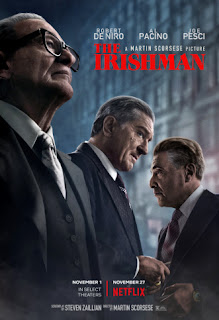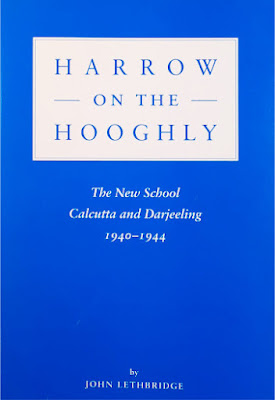The Irishman
I've been out to the cinema very little this year, despite a new Everyman opening up near me, and in general every inclination to see several good ones which came and went. The Irishman really wouldn't have been on my list, not that I thought it'd be bad, certainly not, but the thought, "Not another Martin Scorsese gangster epic??"
Anyway, I went along with this choice, some other friends had recommended it and, what the hell. Some context for my half heartedness: no matter how honest these mafia films are about these characters and the world they inhabit, I feel the very fact that they are so well made gives them undue glamour. A case in point is Scorsese's Goodfellas which I thought was a truly great piece of cinema, but which still featured somewhat sympathetic characters and made them look cool.
I can't think that about The Irishman. With this film, Scorsese has stripped away all of the false glamour which might have attached to the mafia life. For all that relationships of 'respect' are established, 'honour' is satisfied, and hits are only sanctioned after weighty moral consideration, these are terrible people whose motivations are utterly venal. The very long film ends on the flattest of dead notes, with all the principals dead or dying, forgotten in rest homes, and unvisited by friends and families. Their squalid lives have damaged everyone around them, and have meant nothing.
Unless we count episodes like this one. I hadn't appreciated that the film is in fact closely based on researched history, specifically the disappearance of Jimmy Hoffa, the notorious leader of America's biggest labour union in the Sixties. It seems this film tells what is very likely to be the true story, that though very close to Hoffa for a very long time, a friend in fact, the killer was the Irishman of the title, Frank Sheeran. And in talking about Hoffa, you also have to talk about the Kennedys, Jack and Bobby. The film does come close to saying that Jack himself was involved with the mafia; while the hostility between Hoffa and Bobby Kennedy, especially as Attorney General, was very real. The pic below shows several of the main characters reacting to the news of JFK's death.
The picture also features another aspect of the film which has received major attention, to the extent of distracting from the themes of the film; the extensive use of 'de-aging' technology, here applied to Ray Romano, Robert de Niro (Frank Sheeran) and Al Pacino (Jimmy Hoffa). In this shot, it's okay, but for me it just didn't work, especially as applied to de Niro. I guess they were never going to win, given that the film covers such a long chunk of his life, from World War 2 onwards. To be particular, in my view the technology used on hair and skin is hugely impressive, but his eyes are the rheumy eyes of the old man he is. Worse, if anything, his body and posture don't seem 'de-aged' at all, and if you observed him across the street, you wouldn't read him as even middle aged.
I mind less the fact that de Niro doesn't resemble Sheeran at all, it's less of an issue here, than de Niro's ability to convey Sheeran's callousness and lack of any empathy for human life, apparently given shape during the war in Italy. When he also learned Italian, which later eased him into mafia circles.
The limited part women play in the film is crucial. And the limited number of lines given to Anna Paquin, who plays Sheeran's daughter Peggy, has been criticised but seemingly massively misunderstood. As more perceptive critics have pointed out, her silence is part of the point. When Hoffa's disappearance hits the news, the family are watching and Peggy sees her father's complacent reaction and challenges him. Why hasn't he joined in the hunt? Why hasn't he phoned Hoffa's wife? She liked Hoffa; she then turns her back on him and never speaks to him again. I'm not sure we have to emphasise her femininity here too much: I'm sure that what we need to take in is that it's his child, indeed his children, who want no part of the life he leads. One of the most eloquent moments in de Niro's performance is, for me, when he eventually does telephone Hoffa's wife. He can barely get the words out, he's practically incoherent. It's beyond him to play the part of the friend he's supposed to be. As for his children, as another daughter says to him, he may have thought he was protecting them, but they could never come to him with a problem, because of the terrible things he would do.
Let's dismiss another minor criticism, of the length of the film. I never felt it, and I know I'm not alone. The pacing is masterful, even including the road trip which provides a thread through most of the film, a slowly unfolding narrative full of tension with hidden purposes. The film grips, and despite the technical unhappiness I have with the de-aging, and my dislike of the genre, the film has great power, most of all in showing what a sheer waste of lives these people perpetrated.
Anyway, I went along with this choice, some other friends had recommended it and, what the hell. Some context for my half heartedness: no matter how honest these mafia films are about these characters and the world they inhabit, I feel the very fact that they are so well made gives them undue glamour. A case in point is Scorsese's Goodfellas which I thought was a truly great piece of cinema, but which still featured somewhat sympathetic characters and made them look cool.
I can't think that about The Irishman. With this film, Scorsese has stripped away all of the false glamour which might have attached to the mafia life. For all that relationships of 'respect' are established, 'honour' is satisfied, and hits are only sanctioned after weighty moral consideration, these are terrible people whose motivations are utterly venal. The very long film ends on the flattest of dead notes, with all the principals dead or dying, forgotten in rest homes, and unvisited by friends and families. Their squalid lives have damaged everyone around them, and have meant nothing.
Unless we count episodes like this one. I hadn't appreciated that the film is in fact closely based on researched history, specifically the disappearance of Jimmy Hoffa, the notorious leader of America's biggest labour union in the Sixties. It seems this film tells what is very likely to be the true story, that though very close to Hoffa for a very long time, a friend in fact, the killer was the Irishman of the title, Frank Sheeran. And in talking about Hoffa, you also have to talk about the Kennedys, Jack and Bobby. The film does come close to saying that Jack himself was involved with the mafia; while the hostility between Hoffa and Bobby Kennedy, especially as Attorney General, was very real. The pic below shows several of the main characters reacting to the news of JFK's death.
The picture also features another aspect of the film which has received major attention, to the extent of distracting from the themes of the film; the extensive use of 'de-aging' technology, here applied to Ray Romano, Robert de Niro (Frank Sheeran) and Al Pacino (Jimmy Hoffa). In this shot, it's okay, but for me it just didn't work, especially as applied to de Niro. I guess they were never going to win, given that the film covers such a long chunk of his life, from World War 2 onwards. To be particular, in my view the technology used on hair and skin is hugely impressive, but his eyes are the rheumy eyes of the old man he is. Worse, if anything, his body and posture don't seem 'de-aged' at all, and if you observed him across the street, you wouldn't read him as even middle aged.
I mind less the fact that de Niro doesn't resemble Sheeran at all, it's less of an issue here, than de Niro's ability to convey Sheeran's callousness and lack of any empathy for human life, apparently given shape during the war in Italy. When he also learned Italian, which later eased him into mafia circles.
The limited part women play in the film is crucial. And the limited number of lines given to Anna Paquin, who plays Sheeran's daughter Peggy, has been criticised but seemingly massively misunderstood. As more perceptive critics have pointed out, her silence is part of the point. When Hoffa's disappearance hits the news, the family are watching and Peggy sees her father's complacent reaction and challenges him. Why hasn't he joined in the hunt? Why hasn't he phoned Hoffa's wife? She liked Hoffa; she then turns her back on him and never speaks to him again. I'm not sure we have to emphasise her femininity here too much: I'm sure that what we need to take in is that it's his child, indeed his children, who want no part of the life he leads. One of the most eloquent moments in de Niro's performance is, for me, when he eventually does telephone Hoffa's wife. He can barely get the words out, he's practically incoherent. It's beyond him to play the part of the friend he's supposed to be. As for his children, as another daughter says to him, he may have thought he was protecting them, but they could never come to him with a problem, because of the terrible things he would do.
Let's dismiss another minor criticism, of the length of the film. I never felt it, and I know I'm not alone. The pacing is masterful, even including the road trip which provides a thread through most of the film, a slowly unfolding narrative full of tension with hidden purposes. The film grips, and despite the technical unhappiness I have with the de-aging, and my dislike of the genre, the film has great power, most of all in showing what a sheer waste of lives these people perpetrated.





Comments
Post a Comment